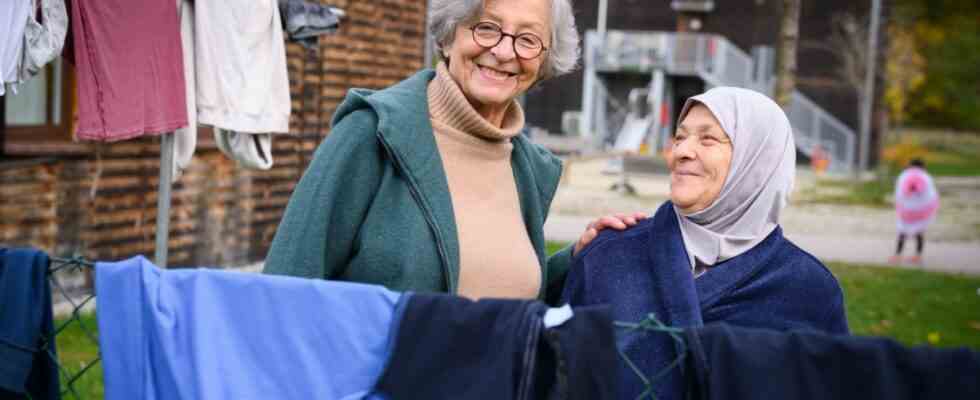In acute emergencies, everyone has always been there: in 2015, when many refugees from Afghanistan or Syria had to find shelter in the Würmtal, or this year, when people from the Ukraine are looking for protection – there have always been large numbers of volunteers in Gräfelfing, Planegg and the surrounding area Number ready to tackle spontaneously and take in refugees. Now the ranks in the Asylum Würmtal helpers’ circle are thinning. At a time when a large number of newcomers is expected again – District Administrator Christoph Göbel (CSU) even expects more than 2015 – the circle of helpers is struggling to find new blood.
The circle of helpers Asylum Würmtal has just celebrated its 30th anniversary. The group of volunteer helpers came together in the early 1990s when refugees arrived in Würmtal during the Balkan War. Since then, the volunteers have continuously stood by people who had to gain a foothold far from their homeland, needed help with dealing with the authorities, with school registrations, with language courses or needed psychological help. When the refugees from the Syrian war and from Afghanistan received emergency care in the gyms in 2015, they could count on the support of up to 150 helpers, says the coordinator of the helper group, Elisabeth Schneider-Eicke. “That has changed.”
The many volunteers who were always spontaneously on the spot either haven’t gotten in touch recently or they have their permanent families who they look after independently over the long term, says Schneider-Eicke. At the moment there are only about ten active members in the circle of helpers, eight of whom were among the first helpers. The circle of helpers is in a “state of thinning and obsolescence,” said Ulrich Essig from the circle of helpers in his speech on the occasion of the anniversary. Young people are urgently needed in order to survive in the long term.
The lack of helpers is clearly noticeable right now. According to Schneider-Eicke, as soon as a place becomes available in the refugee accommodation designed for almost 400 people in Gräfelfing and Planegg, new refugees move in immediately. That has been the case for two weeks and the pressure is growing. At the moment, many people are coming from sub-Saharan Africa who are fleeing from hunger and drought, but a mother with six children from Moldova has also just arrived. The newcomers in particular need intensive support because you have to start “from scratch,” says Schneider-Eicke: “There’s a lot of paperwork to do.”
Support for Ukrainian families now takes place outside the circle of helpers
Actually, the willingness to help in the Würmtal is great. The Ukrainian refugees accommodated in Gräfelfing and Planegg could rely on the help of many volunteers, says Schneider-Eicke. The group of helpers organize themselves independently and do not belong to the circle of helpers. She learned that many people who were willing to help explicitly only wanted to help Ukrainian refugees. This is always justified with the statement that these are Christians, one feels culturally closer to them: “There is no fear of the foreign.” On the other hand, there is sometimes help for families from Africa or Arab countries. “If you’re invited to an Afghan family and sit down on the carpet to eat, that puts some people off,” Schneider-Eicke learned. The circle of helpers was “shocked” when the few activists found out that many young “well-off” citizens would help the Ukrainian refugees, some with generous donations – “we miss that,” says Schneider-Eicke.
The circle of helpers now wants to push ahead with the search for new volunteers – before more refugees arrive. As a group of helpers, they want to take on those tasks that the authorities usually cannot grant, said Ulrich Essig at the anniversary celebration. This includes the granting of small loans for the interim financing of lawyers, emergency aid in special emergencies, arranging psychotherapeutic help, additional care for children or, in individual cases, special learning support. The circle of helpers is dependent on donations and grants from the communities.
Schneider-Eicke also emphasizes that any kind of help is welcome: three hours of German lessons a week, stopping by a family every second or third day to see if the people are getting along, accompanying them to an office, going to school and helping them, Choosing a type of school for the children, calling on the community – it doesn’t matter how much time someone can offer their help, everything is welcome, says Schneider-Eicke, only: “You have to be able to rely on it.” New helpers could draw on the experience of the veteran. Ulrich Essig emphasized in his speech on the occasion of the anniversary that the work of the helpers’ group is indispensable: It must be clear to everyone “that we as a society will have to deal with the reception, accommodation, care and integration of many refugees for decades to come”.

